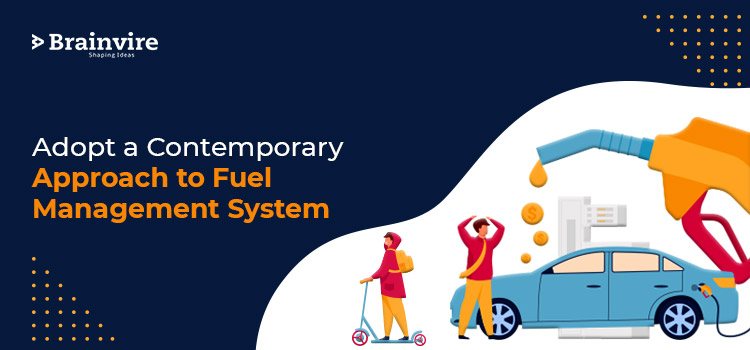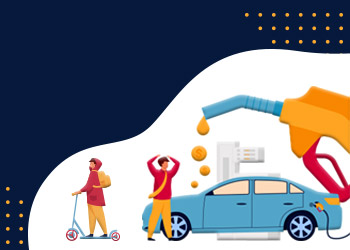
Fuel is the most expensive element in the entire fleet management process. 24% of the net fleet cost comprises the fuel cost. It is important to have a robust fuel tracking system to enable a smooth fleet management process.
There are insurance and other alternatives to manage other factors in the fleet management process. However, when it comes to fuel, the adoption of a reliable fuel management system is the only choice you have.
One of the modern ways to manage a fuel control system is through telematics. Telematics is a rare combination of telecommunication and computer informatics. Telematics can assist fleet managers in a fleet fuel management system and the overall fleet management process.
In this article, we have shared light on the following topics related to marine fuel management system and the ideal fleet management process:
- Understanding the Fuel Management System
- Striking Difference Between Off-the-Shelf and Customized Fuel Management System
- Prominent Features of a Strong Fuel Management System
Understanding the Fuel Management System
An ideal blend of software and hardware systems is required to build a good fuel management system. Such a system with cloud integration services allows fleet managers to track, command, and optimize fuel consumption and eventually save resources.
The hardware component uses a telematics system to share real-time vehicle status through the telecommunication device. On the contrary, the software component obtains real-time data through the sensors affixed in the vehicle. All the data related to fleet delivery, fuel storage, and consumption are showcased here.
This advanced tech solution monitors a diverse amount of information, accumulates, data, and reflects it on the software platform graphically. This way, you can examine your fleet’s fuel costs and reduce its consumption.
Earlier, fleet managers carried out this task manually but, today, they can rely on android app development services to custom-built an application to ease management.
Striking Difference Between Off-the-Shelf and Customized Fuel
Management System
There are two ways to leverage the perks of fuel management systems:
- Off the shelf software
- Customized fleet management system
Off the shelf, the software is a standard readymade solution with specific features such as:
- Easy installation
- Reduced upfront costs
- Standard features
This software is designed considering the large audience and hence doesn’t cover all pain points.
On the contrary, a customized fleet management system is specifically designed to overcome your business hurdles. Unlike the previous option, this customized software is highly secure, scalable, powerful and open to modifications.
Now, how do you choose the best system?
The simplest and convenient way to select the system is to determine your fleet requirements accurately. Once you have done so, you will have a clear picture of the features required in your system.
We have discussed a few important features that one must include in their fleet management system.
Prominent Features of a Strong Fuel Management System
Fleet management is a business where you ought to chop off unwanted edges to optimize your ROI. It is wiser to hire iOS developers and invest in a customized fuel management system to attain this goal.
Let’s take a glimpse of the best features required in your fuel management system:
Advanced Monitoring and Managing Capabilities
Fleet managers and their teams spend a significant amount of time monitoring the use and performance of different assets. This exercise can be stressful as well as lead to negligence and eventually in losses in the future.
Intuitive software is the smartest way to resolve this challenge as it allows you to examine individual performances in a hassle-free manner.
A customized fuel management system lets you record all the information related to the quantity of fuel purchased and its current location. It provides you better know-how about fuel consumption and other suspicious transactions.
This system generates reports on fuel billing, transactions, MPF, and tank leakage and is visible on the dashboard. The presence of smart technologies such as ML and AI can also predict fuel costs based on the data accumulated previously.
GPS Tracking
Earlier, there were no facilities to track the fleet and the only source of communication was through the drivers. The implementation of telematics offers real-time information of the fleet on the move.
The modern fuel management systems are integrated with GPS that combines data from telematics devices. The software maps the GPS and displays the actual fleet location.
With GPS, drivers can map the correct ride to their actual destination without wasting any fuel.
Vehicle Maintenance
Fleet management system helps in fuel management but alongside it also assists in vehicle maintenance. You can integrate a customized daily inspection checklist feature to enable timely maintenance.
This way, your vehicle will meet all the government guidelines of vehicle maintenance.
With the help of telematics devices, the system gathers all the raw information for individual vehicles and can be used effectively to manage them.
Integrate the Fuel Card
A fuel card acts like a credit/debit card where all your financial transactions can be maintained. Integrating fuel cards with the system keeps you informed about when, where, and how much fuel was purchased.
The presence of telematics and GPS discards the need for manual data entry. Instead, all this information gets registered automatically in your system.
Optimized Route options
While the fleet is on the move, there is a high probability that the driver may take a longer route or get stuck in the traffic. However, with GPS, route optimization software and telematics devices, they can track the most convenient route.
You can also recommend a convenient route to ensure that they have a prompt and seamless delivery. This helps to save fuel costs, time, and also improves profits.
Fuel Economy Calculator
There is a striking difference between the traditional and modern fuel economy calculators. The most significant difference is that traditional calculators considered only a fixed mileage.
However, modern fuel economy calculators can estimate fuel costs based on previous trips and existing mileage.
Apart from these, you don’t have to spend an additional cost on IT maintenance. The robust Cloud presence triggers timely and secured IT maintenance along with the much-needed configurations.
Related Articles
-
Data-Driven Healthcare For Better Patient Experiences
In this digitally-driven world, where almost every industry has adapted and thrived through digitization, the healthcare industry was thrashed for its slow digital technology adoption and general aversion to providing
-
Top 9 Problems With Big Data And How To Solve Them
Over 90% of the world’s data has been created in the last two years, and with 2.5 quintillion l bytes of data generated daily, it is crystal clear that the
-
A Comprehensive Guide About The Digital Workplace and Why We Need It
We are now in an era where the workplace is not just a physical room occupied during working hours by workers. The workplace today is an always-connected world that provides



